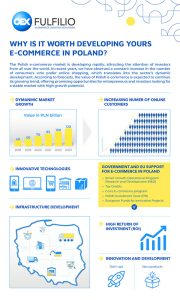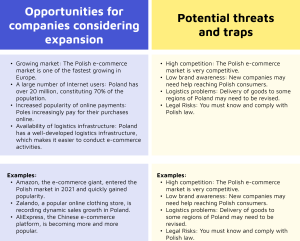

Challenges and pitfalls of expansion into the Polish e-commerce market
Did you know that the Polish e-commerce market is one of the fastest growing in Europe? In 2023, its value exceeded PLN 130 billion, and the forecasts for the future are even more impressive!
Poland may be an absolute gold mine if you are an e-commerce manager looking for new opportunities. This unexpected giant in Eastern Europe offers enormous potential for companies from various industries.
Read on to learn more about Polish e-commerce and why it is worth considering expanding into this dynamically developing market.
What you will find in this article:
- Statistics and trends of Polish e-commerce that will surprise you
- Practical tips for companies wanting to enter the Polish market
- Comparison of Polish e-commerce with markets in other European countries
Take advantage of the opportunity to discover the potential of Polish e-commerce!
Characteristics and dynamics of the Polish e-commerce market
The Polish e-commerce market is developing at an impressive pace. In 2023, its value exceeded PLN 130 billion, which means an increase of 20% compared to the previous year. It is one of Europe’s fastest-growing e-commerce markets, ranking 10th in value.
For an entrepreneur from outside our country, this is a perfect forecast for developing his e-commerce. Poles buy a lot and often online, and the most popular product categories include:
- Electronics (23%)
- Fashion (22%)
- Home and garden (17%)
- Health and beauty (12%)
- Books and toys (9%)
When it comes to e-commerce platforms, Allegro reigns supreme in Poland. With over 20 million active users, it’s the go-to marketplace for most Poles. However, it’s important to note that other platforms like Shopee, Amazon, Empik, and Media Markt also enjoy significant popularity among Polish consumers.
Why is it worth investing in Polish e-commerce?
Poland, as a Central European country, thus connecting the West and the East of the world, offers many factors supporting the development of e-commerce. It is reported that over 70% of Poles regularly use the Internet. Access to new technologies and modern platforms for selling various goods makes us eager to shop online. According to research, psychological barriers related to openness and trust in this type of purchase are decreasing yearly. It is also essential that fast and secure online payments such as BLIK and PayU are becoming increasingly popular.
Poland also boasts a well-developed logistics infrastructure. Access to many courier companies, delivery methods, the possibility of deferred payments for goods, and collection points ensure quick and convenient parcel delivery to every corner of the country.

Support for e-commerce companies when selling on Polish and foreign marketplaces
Each Polish marketplace has its specificity. The situation is similar to that of e-commerce platforms abroad. Learning and testing your solutions on your own may prove quite risky, so it is worth starting cooperation with an omnichannel agency that supports e-commerce entrepreneurs from implementation to effective execution of online activities.
Our recommended partner, the SellerSwitch agency, is a global leader in advising clients on marketplace business ventures. They specialize in supporting foreign companies in establishing and expanding their online businesses in Poland and the European Union, offering a wealth of experience and expertise that can significantly boost your chances of success.
The service package of such an agency should include the following elements:
- Market research and competition analysis
- Development of an e-commerce strategy
- Creation and implementation of an online store
- Online marketing and promotion
- Customer service and logistics
Visit these websites to learn more about building a business in Poland and the EU.
Chamber of Electronic Commerce: https://eizba.pl/
Gemius: https://www.gemius.pl/
SellerSwitch: https://sellerswitch.com/
Legal, regulatory, and logistic foundations of e-commerce in Poland
Polish e-commerce is based on solid legal, regulatory, and logistic foundations. However, before starting your e-commerce business in Poland, several key aspects are worth considering.
Polish legislation and regulations regarding e-commerce
Adapting to changes in Polish e-commerce regulations is a must. These laws can be intricate and are often revised. Therefore, it’s vital to stay vigilant and modify your activities to ensure compliance and the smooth running of your business.
To properly understand and interpret Polish e-commerce legislation and regulations, please read the following laws:
- Act on the provision of electronic services (Journal of Laws of 2002, No. 144, item 1204)
- Consumer Rights Act (Journal of Laws 2014, item 827)
- Civil Code (Journal of Laws 1964, No. 16, item 93)
- GDPR Regulation (Regulation (EU) 2016/679 of the European Parliament and of the Council)
Why is knowledge of laws important for an entrepreneur?
Having a comprehensive understanding of the laws is a powerful tool for any entrepreneur, regardless of their industry. It equips them to make informed decisions, protect their business interests, and navigate the complex legal landscape with confidence.
- Act by the law: Compliance with applicable laws is crucial to avoid penalties and sanctions. Ignorance of the laws does not exempt you from responsibility for violating them.
- Protection of your interests: Laws regulate many aspects of running a business, such as concluding contracts, protecting personal data, and advertising. Knowledge of one’s rights and obligations allows entrepreneurs to protect their interests effectively.
- Avoiding misunderstandings and disputes: Knowledge of the laws can help you avoid misunderstandings and disputes with contractors, clients, and state administration bodies.
- Making informed decisions: Knowledge of the laws allows an entrepreneur to make informed business decisions, considering all relevant factors.
The acts listed above refer to essential facts and legal recommendations for entrepreneurs. We can read important information from them.
The Act on Freedom of Business Activity sets the rules for starting and running a business. Knowledge of the Civil Code, in turn, helps to understand regulations related to civil law relations, such as concluding contracts, obligations, and liability for damages. By reading the Personal Data Protection Act, you can learn about the principles of their processing. The Accounting Act defines the principles of accounting by entrepreneurs.
Knowledge of the laws is essential for every entrepreneur who wants to conduct business legally and safely. It is worth keeping up to date with changes in legislation to adapt your business to new regulations.
Tax specifics and data protection requirements
Running an e-commerce business in Poland requires meeting several tax and personal data protection obligations. First, you should know that VAT, CIT tax, the Personal Data Protection Act, and the GDPR apply in Poland.
Regarding taxes, it is worth mentioning that the VAT tax base in Poland is 23%. Reduced VAT rates (8%, 5%, 0%) apply to certain goods and services, e.g. food, books, medicines. In turn, corporate income tax is 19%. Entities conducting e-commerce activities are obliged to issue VAT invoices and record sales.
When it comes to data protection, it’s not enough to simply be aware of the Data Protection Act. It’s essential to understand and consistently adhere to the GDPR, an EU legal act that governs the protection of personal data (regardless of their registered office). As personal data controllers, e-commerce business owners have a continuous obligation to ensure the security of personal data, including safeguarding it against unauthorized access, use, or disclosure.
Logistics and distribution
Logistics and distribution play a pivotal role in the success of every online store. Their efficient management is not just a necessity but a key driver for customer satisfaction and the overall prosperity of your business.
Therefore, it is worth first looking at available logistics operators who offer parcel delivery services to consumers. The most popular ones include:
- Poczta Polska (Polish National Post): offers comprehensive coverage and competitive prices, but delivery times may be longer than with other operators.
- InPost specializes in deliveries to parcel lockers, which is convenient for customers and allows for quick parcel delivery.
- DPD: offers fast and on-time deliveries, but prices may be higher than those of other operators.
- DHL: offers various logistics services, including international deliveries.
- UPS: offers fast and safe deliveries to over 220 countries worldwide.
Delivery challenges
Delivering the shipment to the customer is often the most challenging logistics stage. Several factors contribute to this.
The last mile in parcel delivery
First, customers may want their parcel delivered to their home address, work address, parcel locker, or other collection point. This diversity is sometimes a problem for the logistics company and the courier, who, for example, has incorrect data and cannot deliver the shipment according to the customer’s wishes. Customers often expect delivery at a time convenient for them, which requires flexibility on the part of the logistics operator. However, the growing popularity of e-commerce causes increased shipments, which may lead to longer delivery times.
There are various solutions to these challenges to meet customer expectations. It is worth considering cooperation with different logistics operators. This allows you to choose the operator that offers the best delivery conditions for a given type of recipient. In turn, allowing customers to choose their delivery date allows delivery to be better tailored to customer needs. Modern technologies, such as shipment tracking systems, make it easier to monitor deliveries on an ongoing basis and thus respond to irregularities on time.
Timely delivery of parcels
Customers expect fast and on-time deliveries. Delivery delays may lead to dissatisfaction with the service and cancellation of the order. This can have a direct impact on posting and sharing negative opinions. Customers may share their negative opinions about the online store on social media or opinion-forming websites. Effect? The online store loses customer trust.
Preventing delivery problems is possible through strategic partnerships with reliable logistics operators. These partners play a key role in ensuring timely deliveries, which is crucial for maintaining customer satisfaction. It’s also important to set realistic delivery times to avoid customer disappointment and to keep customers informed about their order status and expected delivery date through automated notifications.
Parcel returns
Managing merchandise returns can be costly and time-consuming. One factor influencing this state of affairs is the transport costs associated with returning the goods, which are borne by the online store. You can add return processing to the list. The online store must check the returned goods and refund the customer. However, it is also worth realizing that the returned goods may be damaged or incomplete, which reduces their value.
To avoid problems related to returning parcels, it is worth making the return process more accessible for customers, i.e., creating clear and simple procedures for returning goods. It is a common practice to provide customers with the opportunity to return the goods free of charge. It is an excellent idea to cooperate with companies such as OEX Fulfilio that have a returns service to ensure the process is sufficiently refined. These companies can help you process returns and reduce their costs.

Cultural and linguistic challenges, as well as marketing and customer relations in Poland
The Polish e-commerce market is unique, and to succeed here, companies must adapt their strategies to local realities. This includes not only localizing your website in Polish but also adapting your content to Polish culture and mentality, both on the website and in your marketing materials.
To ensure the correctness and adaptation of your content to the Polish user, it’s crucial to understand and respect cultural nuances. This understanding will help you navigate differences in communication styles, holiday celebrations, and price negotiations.
Here are some examples of how online stores manage to adapt their communication to Polish customers.
- Allegro, the Polish e-commerce giant, offers its customers a website in Polish and dedicated marketing campaigns.
- Zalando, a popular online clothing store, has adapted its offer to Polish preferences, introducing popular Polish brands.
- IKEA, a Swedish furniture manufacturer, includes Polish customs and traditions in its advertisements.
Effective marketing strategies and building trust among Polish consumers
Polish consumers care about the quality of products because they value product presentation in a reliable, authentic, and accurate manner. Price is also essential in determining a purchase, but Poles are increasingly paying attention to other aspects, such as quality, comfort, and professional customer service.
To be successful in the Polish e-commerce market, an essential aspect is also worth taking care of: building trust. Polish customers can be hesitant and distrustful, and it takes them some time to trust a given brand. They are helped in this by finding positive opinions from other customers, visible certificates and quality guarantees, and transparency at every stage of the purchase.
Good examples of how brands have successfully incorporated marketing strategies to build trust with customers include:
- Ceneo, a price comparison website, allows customers to compare product prices and read the opinions of other users.
- Opineo, a review site, allows customers to share their online shopping experiences.
- Allegro offers its customers a buyer protection program, which guarantees a refund in case of problems with the order.
Finally, social media and influencer marketing are worth mentioning as positive strategies and channels supporting e-commerce sales.
- Rossmann, a popular drugstore, is active on Facebook and Instagram.
- Lidl, a grocery discounter, cooperates with influencers on YouTube and Instagram.
- Nike, a sportswear manufacturer, uses social media to promote its products and values.
SWOT analysis: Opportunities and threats on the Polish e-commerce market
Before you step toward the Polish market, performing a SWOT analysis is worth creating a model of opportunities and potential risks.

The Polish e-commerce market is an attractive market for companies considering expansion. There are many opportunities for success, but you must also consider potential risks. Conducting a SWOT analysis before entering the Polish market can help companies minimize risk and increase their chances of success.
Strategies for minimizing risk and maximizing success in the Polish e-commerce market
To be able to talk about potential success in the Polish e-commerce market, attention is paid to recommendations regarding market research, product testing, and strategic partnerships.
Therefore, focus on conducting thorough market research. Get to know it as best you can, including consumer trends and how the competition operates. Then, test your products before you introduce them to the market. See how a small group of consumers react to them, collect feedback, and think about your brand development strategy. An essential aspect is establishing strategic partnerships with Polish companies with experience in e-commerce. An example of such a company is OEX Fulfilio, which has been helping e-commerce clients develop their business in Poland for over two decades and supports logistics activities from A to Z. Together with partners such as SellerSwitch, Taxology, and Topolski Group, OEX Fulfilio secures the interests of every e-commerce entrepreneur when entering the Polish and European market.
It is also worth looking at market examples of success in e-commerce:
- Zalando conducted market research before entering the Polish market to learn about the preferences of Polish consumers.
- Allegro offers its partners the Allegro Partner program, which allows them to sell their products on the Allegro platform.
- Ceneo cooperates with Polish influencers to promote its products.
Product innovations and adaptations to local needs
To meet customer requirements, in addition to researching the market and competition and testing your products, it is worth considering how they can be innovative for the end customer. If you offer new products related to new technologies, be aware that Polish consumers will pay attention to them.
If you want to sell locally, please consider Polish customs and preferences. These observations included, among others:
- Allegro introduced the Allegro Pay service, which allows Polish customers to pay for online purchases in installments.
- Zalando offers Polish customers the possibility of free return of goods.
- IKEA has adapted its offer to Polish needs, e.g., by offering smaller furniture sizes.
Summary
The Polish e-commerce market is one of the fastest growing in Europe. It offers many opportunities for companies considering expansion but also comes with challenges.
To be successful, companies must adapt their strategy to local realities. The key is:
- Localize the website and adapt the content to the Polish language and Polish mentality.
- Considering cultural nuances, such as communicating, celebrating holidays, or negotiating prices.
- Building trust among Polish consumers through reliable product information, high-quality customer service, and secure payments.
- Adapting the marketing strategy to Polish realities and considering the role of social media and influencer marketing.
- Investing in product innovations and adapting the offer to local needs.
Thorough research, appropriate strategy, and tailoring the offer to local needs can ensure companies’ success in this dynamically developing market. If you need support starting your expansion into the Polish market, contact us, and let’s discuss your needs.


